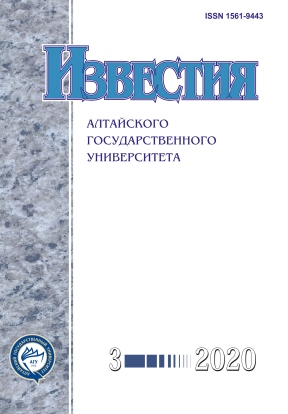The Processes of Adaptation and Employment of Migrants from the Republic of Tajikistan in the Russian Federation (1991-2019)
УДК 94 (575.3). 084.9 + 94 (470). 084.9 ББК 63.3 (5 Тад) 6-284.6 + 63.3 (2) 6-284.6
Abstract
The article is devoted to the processes of adaptation and employment of migrants from the Republic of Tajikistan in the Russian Federation from 1991up to 2019. The author applied the conditional division of this period into two stages — from 1991up to 2000 and from 2001 up to the present time — according to the quantitative and qualitative differences that characterize each stage. Within the frameworks of both stages, historical, sociocultural and legal factors that influence the processes of adaptation and employment of Tajik migrants in the Russian Federation are analyzed. At the end, it is concluded that from 1991 to the present moment these processes have undergone a complex evolution. A negative impact on these processes is noted, exerted by the lack of large-scale domestic proj ects and programs aimed at helping and supporting labor migrants, as well as by imperfections in the migration legislation of the Republic of Tajikistan and the Russian Federation. However, the Government of the Republic of Tajikistan understands the need for cooperation with the Russian Federation in order to streamline the status of labor migrants from the Republic of Tajikistan in the Russian Federation and their protection, readiness for this cooperation, the officially expressed position of the Government of the Russian Federation, active work carried out in this direction by the Russian Federation of Migrants, and also by Tajik public organizations and human rights defenders, in general, indicate a positive trend in the decision to problems that impede the processes of adaptation and employment of migrants from the Republic of Tajikistan on the territory of the Russian Federation.
Downloads
Metrics
References
Чуфрин Г.И. Евразийская интеграция и проблемы трудовой миграции населения // Запад — Восток — Россия. 2017.
Erlich A. Tajikistan: From Refugee Sender to Labor Exporter // Migration Policy Institute. 2006. 1, Jul. URL: https://www.migrationpolicy.org/article/tajikistan-refugee-sender-labor-exporter.
Rowland R.H. National and Regional Population Trends in Tajikistan: Results from the Recent Census // Eurasian Geography and Economics, 2005. URL: https://www.researchgate.net/publication/250170298_National_and_Regional_Population_Trends_in_Tajikistan_Results_from_the_Recent_Census. DOI: 10.2747/1538-7216.46.3.202.
Абулхаев Р.А. Из истории трудовой миграции Таджикистана в конце XX — начале XXI вв. Душанбе, 2014.
Бабаханов М.Б. История таджиков мира. Душанбе, 2005.
Саъдиев Ш.С. Тоҷикистон: роҳи сулҳ ва ризоияти милли. Душанбе, 2002.
Rybakovsky L., Ryazantsev S. International Migration in the Russian Federation // United Nations Expert Group Meeting on International Migration and Development. New York, 2005. 5, Jul. URL: https://www.un.org/en/development/desa/population/events/pdf/expert/8/Ryazantsev_pp.pdf.
Olimova S., Bosc I. Labor Migration from Tajikistan // International Organization for Migration, 2003. URL: http://publications.iom.int/system/files/pdf/labour_migration_tajikistan.pdf.
Blua A. Tajikistan: Labor Migrants Concerned About New Passport Requirements // Radio Free Europe / Radio Liberty. 2005, 11, Jan. URL: https://www.rferl.org/a/1056791.html.
«Левый» паспорт, подрядчик-лжец и другие проблемы таджикских мигрантов // Sputnik Точикистон. 18.12.2017. URL: https://tj.sputniknews.ru/analytics/20171218/1024203001/problemy-dokumenty-obman-migranty-tadzhikistan.html.
За пять лет поток мигрантов из Таджикистана за рубеж снизился на 40% // Настоящее время. 07.02.2019. URL: https://www.currenttime.tv/a/tajikistan-migrants-workers-money/29756218.html.
Условия для мигрантов из стран Центральной Азии постараются улучшить // Общественное телевидение России (ОТР). 05.02.2019. URL: https://otr-online.ru/news/usloviya-dlya-migrantov-iz-stran-centralnoy-azii-postarayutsya-uluchshit-119909.html.
Labor Migrants in Russia Continue to Face Legal Challenges // The New Humanitarian. Moscow, 2006. 18, May. URL: http://www.thenewhumanitarian.org/fr/node/202948.
Когда мигранты из Таджикистана могут рассчитывать на амнистию в России? // Muhojir.info. 03.06.2019. URL: http://muhojir.info/news/840.
Назаршоева С.Ф. Проблемы адаптации трудовых мигрантов из Республики Таджикистан в Российской Федерации // Актуальные вопросы юриспруденции : материалы VI Международной студенческой научно-практической конференции (Душанбе, 26 апреля 2019 г.). Душанбе, 2019.
Махмадов К. Российская квота для таджикских мигрантов вполне достаточна // Бизнес и политика. 2007. 4 февр.
Izvestiya of Altai State University is a golden publisher, as we allow self-archiving, but most importantly we are fully transparent about your rights.
Authors may present and discuss their findings ahead of publication: at biological or scientific conferences, on preprint servers, in public databases, and in blogs, wikis, tweets, and other informal communication channels.
Izvestiya of Altai State University allows authors to deposit manuscripts (currently under review or those for intended submission to Izvestiya of Altai State University) in non-commercial, pre-print servers such as ArXiv.
Authors who publish with this journal agree to the following terms:
- Authors retain copyright and grant the journal right of first publication with the work simultaneously licensed under a Creative Commons Attribution License (CC BY 4.0) that allows others to share the work with an acknowledgement of the work's authorship and initial publication in this journal.
- Authors are able to enter into separate, additional contractual arrangements for the non-exclusive distribution of the journal's published version of the work (e.g., post it to an institutional repository or publish it in a book), with an acknowledgement of its initial publication in this journal.
- Authors are permitted and encouraged to post their work online (e.g., in institutional repositories or on their website) prior to and during the submission process, as it can lead to productive exchanges, as well as earlier and greater citation of published work (See The Effect of Open Access).








